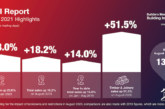New research into the extent of the skills shortage has found that 83% of businesses within the construction industry are currently feeling the strain from a lack of skilled workers.
The report, by multi-discipline recruitment specialist, Search Consultancy, also added that on average, businesses in the industry are 22% understaffed with the average lead time to hire a suitable candidate standing at just below four months.
The full list, which ranks sectors from most to least affected by the skills shortage, is:
- Engineering & manufacturing: 85%
- Financial services – 84%
- Healthcare – 84%
- Construction – 83%
- Call & contact centre – 75%
- Industrial – 77%
- Accountancy & finance – 74%
- Scientific – 74%
- Social work – 74%
- HR – 73%
- Logistics/ procurement/supply chain – 72%
- Business support – 71%
- Hospitality – 68%
- Transportation – 68%
- Marketing – 66%
- Legal – 58%
- Sales – 52%
The research also looks into the causes of the skills shortage and the impact it is having on businesses within the construction industry. Of those surveyed, 36% say that a simple lack of qualified candidates is the main contributing factor. A further 25% of managers cite an inability to retain staff as a major issue and 25% list Brexit is a key contributing factor.
23% of managers also believe their industry is experiencing a skills shortage due to job cuts, with 22% saying a lack of training opportunities is a concern. One in five also states insufficient funding within the sector as a contributing factor.
As a result of the skills shortage in their industries, 39% of managers say staff have had to work longer hours with one in five facing larger operational costs. More than a quarter (28%) of managers surveyed admitted to poor quality of work being produced and a further 26% were unable to fulfil work commitments to clients and customers.
Paul Kynaston, Managing Director of Construction & Property at Search Consultancy said: “Having worked in the Construction sector for almost 25 years, I have seen skill shortages intensify year on year. The industry has an image problem. Construction work is seen as dangerous, poorly paid and dirty and I think young people are now looking for quicker career movement than it’s traditionally been possible to achieve.
“The reality is something very different. Projects are now diverse and dynamic places to work, often at the cutting edge of engineering technology, and salaries/rates of pay have increased dramatically. Indeed, it is not unusual for skilled blue collar workers in the sector to comfortably earn £50k pa.
“One thing is for sure, if the country is to achieve it’s ambitions of having world leading infrastructure, then we’re going to need the people to design and build it and the Construction sector will need to up it’s game to attract the talent of tomorrow.”
To support organisations impacted by the skills shortage, Search Consultancy has curated advice from business leaders within its “Mind the Skills Gap” report.
To download the report and find out more information about Search Consultancy, click here.









